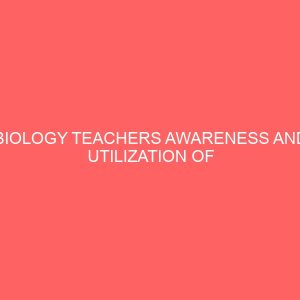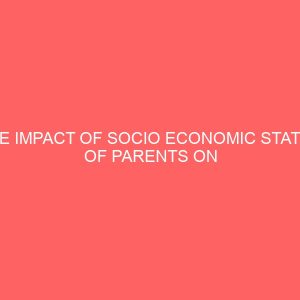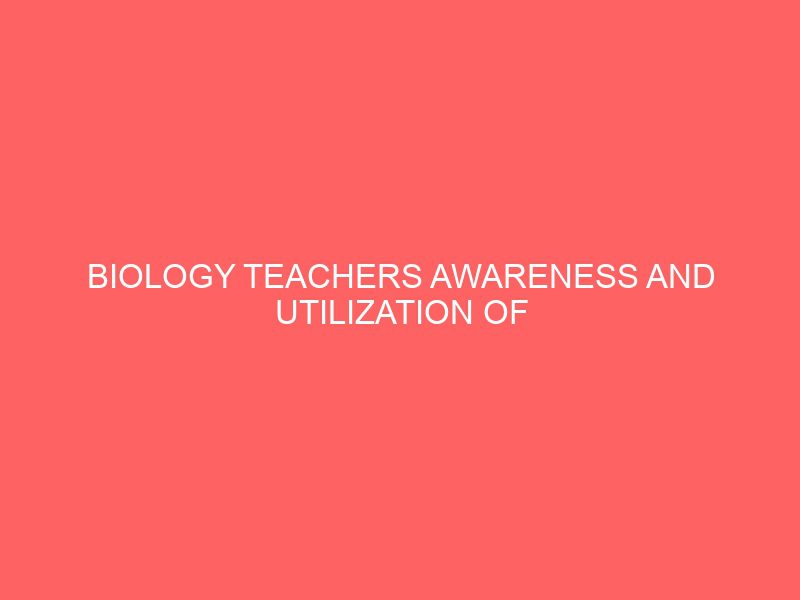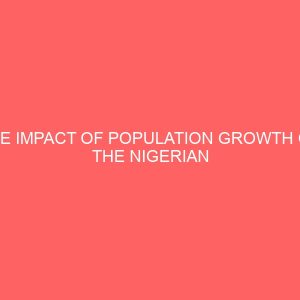Description
CHAPTER ONE
INTRODUCTION
Background to the Problem
The purpose of education is not only to make students literate but also to improve their knowledge, self-sufficiency and their ability to think rationally. In any society, education is tool for growth and progress because it not only imparts knowledge, skill and right type of values, but, also builds human capital which breeds, drives and sets technological innovation and economic growth. Many advances in science and technology have helped nations to promote efficiency, self reliance and the overall wellbeing of humanity through invention/innovation in telecommunication, transportation, health, agriculture etc.
In Nigeria, the National Policy on Education (FRN, 2004) clearly spells out the objectives of science teaching from pre-primary to tertiary level. Specifically, at the Secondary level, it entails equipping students to live effectively in our modern age of Science and Technology. It is aimed at all ages of learners of all abilities and interests. Science is a process that helps in the development of the society. The global change in science curriculum arising from knowledge explosion and new wave in science and technology development demands for qualitative science teaching.
From the range of evidence in the science education literature and studies by Awodi (1984), Akpan (1996), Madu (2004), Okebukola (2005), it is clear that science education in Nigeria is faced with numerous problems that need to be addressed. Such problems include the inability of students to engage in complex problem solving activities and also the inability of Nigerian Students to apply school knowledge to real life problems in work place. The problems need to be addressed so that the goal of equipping students to live efficiently in our modern ages of science and technology as well as the acquisition of appropriate skills, mental, physical and social abilities and competences to live in and contribute to the development of the society, as formulated in the Nigeria National Policy on Education (FRN, 1981; 1998.) is achieved.
Buseri (2010) contends that to meet up with the rapid scientific progress in technology requires the presence of well-trained, efficient, knowledgeable and skillful teachers who are versatile in discharging their duties and responsibility. The persistent poor performance of student in science subjects at School Certificate level and the studies by Achor (2003); Umoren and Ogong (2007); Ogbeba (2009) has given rise to an assumption that most science teachers in secondary schools in Nigeria probably do not make use of varying form of teaching strategies to be able to cope with some specific difficulties associated with the teaching of science. In order words, it implies that teachers are knowledgeable in science content but not in pedagogical aspects. Ezeliora (2004), pointed that most of the time, science is taught to the learners using descriptive or lecture method instead of hands- on approach.
Biology is defined as the basic science that deals with the study of living things, it attempts to understand the teeming diversity of life on earth, a diversity of level we are all part of (Adegbite, 2005). Life is not a simple concept, which may be one of the reasons why the teaching of biology is important (Adegbite, 2005). There are two major branches of biology namely; Zoology (the study of animals) and Botany (the study of plants) and sub-divisions such as ecology, physiology, histology, mycology, entomology, virology, anatomy, etc. The teaching of biology is very important because the knowledge of biology helps in improving the quality of life, as it helps to solve many societal problems relating to health, poverty, food shortage, crop production and environmental conservation.
The learning of biology in real life context is necessary for personal development and also, the development of scientific and technological world. The use of multiple and relevant learning and teaching strategies, and assessment practices will provide a basis for this. In any research work in Biology Education, more attention is placed on science education; this is because biology is one of the various subjects that explain science and also in Nigeria, biology is the general basic science subject. In an attempt to ensure result oriented biology delivery in
schools, Akubuilo (2004) suggested the use of activity-oriented strategies such as guided-inquiry, cooperative learning, demonstration, thinks and do, use of analogy and many others. Thus, research in Science Education in Nigeria has continued to seek better ways of teaching biology in order to improve academic performance of students (Okebukola, 1998).
A teaching strategy is a carefully designed classroom interaction that could be meticulously followed to teach a concept, topic or an idea. This brings out the idea of having numerous strategies. An innovative approach is referred to a design that is full of new or purposively reconstructed existing ideas. This explanation means the use of new or reconstructed existing ideas, methods and equipment or to combine various teaching strategies to develop a new one. Innovation in science education is increasingly needed in order to foster greater scientific literacy. Results from science education researches and the additional technological resources now available are contributing to a change of views with regard to the content, teaching/learning processes and methods and the role of teachers in science classes. Challenging new ways of teaching and learning are becoming available, but can only be implemented when teachers feel faithful to adopting them.
Innovation, according to Hornby (2010), is the introduction of new things,
ideas or a new way of doing things. Ikeobi (1987) defined innovation as the
introduction of something new at any point in time and that to be innovative is to break new grounds. Furthermore, Parlett (1979) added that innovation in teaching includes what might be regarded as evolutionary changes, experiments and applications of educational technology and that may result entirely to new curricula, or radically changed course structure.
Innovation is also defined as the implementation of new and improved knowledge, ideas, methods, processes, tools, equipment and machinery, which
leads to new and better products, services and processes (Williams, 1999).
Innovation in teaching is often about turning an ?invention? such as an idea, technology or technique into a product, process or service that is successful because it meets the needs of learners. Innovative teaching can be shown to assist students to develop not just technical skills and a common core of generic skills, but to support a wider range of capabilities which can assist the individual in the wider world of work and the community.
In science, innovative approach to teaching refers to a design full of new or reconstructed existing ideas. In order words, it implies that the approach does not have to be new, but it uses in that particular concept or topic may be novel. Roger (2003), described innovation as an idea, practice, or project that is perceived as new by an individual or other unit of adoption. He further asserted that an innovation may have been invented a long time ago, but if individuals perceive it as new, then it may still be an innovation for them. In biology, like any other science subject, innovation can be in using new teaching methods, addition of new ideas in the curriculum content, learning experiences, introducing new/modern instructional materials as well as adopting a new change in evaluating the outcomes of biology learning. Innovation in biology is therefore the introduction of new ideas and methods, accompanied by an equally new change in the style of evaluating the outcomes of biology learning.
The need for innovative strategies in teaching biology is borne out of the fact that different situations-teaching topics, learners? cognitive readiness, concept being taught, skills intended to be developed in learners, demands for different teaching approaches. Therefore a teacher who is not aware of a variety of such strategies can neither attempt to use them in the first place or use them accurately. For instance, Achor (2008) considered some teaching modes as learners centered, interest arousing and activity oriented. These include conceptual change strategy, concept mapping, field trip, guided discovery, experimental and demonstration methods. He added that most of these are regarded as modes as teachers are required to employ a numbers of them while teaching.
Researchers have argued that many Nigerian Students do not possess the depth of knowledge on skills to assure either personal life success or national economic competence (Akpan, 1996). A major concern of most of these critics is also the apparent inability of these students to engage in complex problem solving activities and apply school knowledge to real life problems in work place settings. Therefore a teacher needs to be aware of different teaching strategies that are more effective and efficient in the teaching of topics and concepts. From all indications, it is observed that the present methods used in teaching science in secondary schools in Nigeria do not produce maximum results for the acquisition of science process skills by the students; therefore, there is need for the use of multiple teaching strategies including inquiry teaching by all teachers to meet the different learning styles in the classroom.
Ukoha (2008), described the concept of utilization presupposes, that appropriate instructional materials have not been identified, provided and selected for instruction, this statement can also be applied to teaching strategies. According to Blair (1988), many things happen to the student with learning difficulties when the difficulties remain unsolved. The effect of difficulties in learning upon students may not be far out of proportion to the apparent seriousness of the problem, because emotional pressure builds up around students? area of weakness, with this type of difficulty students may fall behind expectation or standard set by teachers, parents and school administrators but this difficulty can be solved through the utilization of appropriate innovative strategies.
Awareness of policies usually forms the backbone of the utilization and productivity level of any programme (Olumorin, 2008). He further asserted that it is when an individual is aware of the principles and content policy that such an individual can cultivate right type of attitude that will result in improved productivity. In the teachers? awareness of the innovative strategies, the decision of the teacher on the utilization of the innovative strategies will be based on the teachers? knowledge on the existence of the innovative strategies. Therefore a teacher who is not aware of the innovative strategies will neither attempt to use them in the first place or use them correctly and adequately.
The issue of what the problem is needs to be addressed in Biology Education, various teaching strategies exist, yet, poor teaching and learning of the subject seems to continue unabated. Then it is necessary to examine which of these strategies are learners-centered and which are teachers-centered. There is also the need to employ scientific method to teach biology at the secondary school level. Other methods may also have their usefulness if employed at the appropriate time for relevant purpose, this is only possible if the teacher is aware of their existence and uses them. Given the diversity and the views expressed by many lecture rooms and classrooms, the role of teachers needs to be different.
Some teaching methods involve the learners more than the others; add meaning to their lives, thereby reflecting in their role in the society which is aimed at in science.
This point is stressed by Barbosa, Jofili and Watts (2004), when they said very little of what science teachers teach will be directly used in these students live. It is on this basis that they advocated for science teachers to look beyond the utility argument of the subject to see what aspects of science that are needed to enrich the lives of the society with the understanding of people. Only the use of appropriate strategies can bring these into realization.
Teachers are said to gain extensive experience of successful and unsuccessful performances throughout their years of teaching, this assumption has generated in-depth research into how teachers who have been involved in teaching for different period of time perceive their teaching ( Soodak & Podell, 1997; Fives & Lisa 2008; Fives, 2010). It has been argued that experience improves teaching skills while pupils learn better at the hands of teachers who have taught them continuously over a period of years (Ijaiya, 2000). Teachers? teaching qualification is another quality of the teacher. This means that the qualification of a teacher matters when it comes to effective teaching. The availability of adequate and qualified science teachers cannot be compromised for the success of any science programme. It has been commented that, however well conceived a
programme is, however valid the theory that underlies it, and whatever the objectives of the plan are, will be determined by the nature, quality, attitudes, motivation and convictions of the classroom teacher (Obomanu & Akporehwe, 2011).
The sources of gender differences in educational outcomes have been the subject of considerable study and debate. One particularly contentious issue involves the possible role played by biological differences between males and females. One hypothesis is that male and female teachers have unique biases with respect to how they engage boys and girls in the classroom, similarly, cognitive process theories (Jones & Dindia, 2004), suggest that teachers may subtly communicate that they have different academic expectations of boys and girls. On teaching strategies, studies by Olagunju & Abiona (2008) revealed that male teachers? perception of utilization of instructional materials in teaching is higher than that of the female teachers. Khurshid and Zahur (2013) discovered that female teachers are more aware and utilize innovative teaching strategies than the male teachers. From these studies, there are no conclusive statements on the gender and teacher?s teaching experience related issues, investigated by the researchers and the studies cited above. As such, this study investigated the effects of teacher?s gender, teacher?s teaching experience and qualification on the utilization of the innovative teaching strategies to determine whether their effects had any significant influence or not.
Statement of the Problem
Science Education is said to be the most appropriate and fastest vehicle for the planned transformation of any society (Jegede, Lagoke & Oyebanji 1995).Despite its? importance to mankind, the effort of researchers to improve its?teaching and learning, as well as it being the general science subject, students? performance in biology compared to the other pure science subjects taught in Nigeria remains low. This observable problem has been blamed on a number of factors, namely, inadequate teachers, inadequate material resources, lack of using effective methodology for the teaching of the subject in secondary schools etc.
Further, it has been observed based on previous studies that the present methods used in teaching science in general and biology in particular in Nigeria secondary schools do not produce maximum result (Maduabum, 1994; Okebukola, 1998).
Researchers in biology education have studied on the various innovative
teaching strategies like, problem solving, field trips, individualism, cooperative learning, use of analogy, constructivism, computer assisted instruction, inquiry,among others and how they can be used to improve the teaching and learning of science in general and biology in particular, examples of such researchers are Olatoye & Adekoya (2009), Yusuf & Adedeji (2010), Oludipe & Oludipe (2010), Jiya (2011), Udeani & Okafor (2012) among others. Most of these researchers studied on the effectiveness of these strategies, some compared these strategies with conventional methods, Olatoye & Adekoya (2010) etc. without examining the awareness of in-service teachers on the existence of these strategies, their level of awareness and the degree of application of the ones they are aware of. Thus, this study was set out to investigate biology teachers? awareness and utilization of innovative teaching strategies in public schools in Oyo South senatorial district, Nigeria.
Similarly, Samba, Achor and Ogbeba (2010), examined science teachers awareness and utilization of 19 innovative teaching strategies in Benue State, but the variables involved were: age, teaching experience and profession and is different from this study as this involved only biology teachers and took into consideration teachers? gender, teaching experience and qualification. Khurshid & Zahur (2013), compared the awareness and utilization of 16 innovative teaching strategies in Private and public sector schools in Islamabad, the variables they took into consideration included teachers? gender, age, teaching experience and professional qualification. The study did not specify on any particular subject, and was general compared to this study which was specifically on Biology teaching at senior secondary level.
The Purpose of the Study
The main purpose of the study was to investigate the biology teachers? awareness and utilization of innovative strategies, specifically the study determined:
The secondary schools biology teachers? awareness of the innovative teaching strategies.
The level of awareness of the innovative teaching strategies by the biology teachers.
The extent to which the innovative strategies are put to use by the biology teachers.
The difference in the utilization of the innovative teaching strategies based on the biology teachers? teaching experience.
The difference in the utilization of the innovative teaching strategies based on the biology teachers? qualification.
The difference in the utilization of the innovative teaching strategies based on the biology teachers? gender.
Research Questions
1. Are the biology teachers in Oyo state, aware of the selected innovative teaching strategies?
2. To what extent are the biology teachers aware of the innovative teaching
strategies?
3. To what extent are the innovative strategies put into use in the teaching of
biology in Oyo state?
4. To what extent does the utilization of the innovative teaching strategies
differ based on the biology teachers? teaching experience?
5. Does qualification of the biology teachers influence the utilization of the
innovative teaching strategies?
6. How does the utilization of the innovative teaching strategies differ based on the biology teachers? gender?
Research Hypotheses
HO1: There is no significant difference in the utilization of the innovative
teaching strategies by experienced and less experienced biology teachers.
HO2: There is no significant difference in the utilization of the innovative teaching strategies by qualified and unqualified biology teachers.
HO3: There is no significant difference in the utilization of the innovative teaching strategies by male and female biology teachers.
Scope of the Study
The research work was limited in scope to the awareness of teachers and the utilization of innovative strategies in the teaching of Biology. It did not view other pure science subjects. The study was also limited to senior secondary school biology teachers. The study took into consideration twenty five (25) innovative strategies out of one thousand two hundred and seventy one (1271) instructional strategies listed by Kelly, (2010). The strategies were chosen based on their relevance to the teaching of biology as well as the studies of several Biology Education researchers. The study covered the nine Local Government Areas which make up the entire Ibarapa and Ibadan1 (Ibadan City), Educational Zones then part of Ibadan2 (Ibadan Less City), Educational Zone, known as Oyo South Senatorial District of Oyo State taking into consideration three out of the six Educational Zones in Oyo State. The study was on public secondary schools in Oyo South Senatorial district and not all schools in Oyo state.
Significance of the Study
In an effort to improve the teaching of biology in Nigerian secondary schools and make the learning of biology more attractive to students, this study may make the following important contributions to knowledge and education.
This study would provide science educators and government with detailed information about the actual picture of biology teaching, biology learning, and effective ways of improving the situation. It provides information on different innovative strategies that can be used to improve biology teaching and learning in senior secondary schools in Nigeria.
The results of this investigation will probably be of great help to students in learning and acquiring knowledge or skills in biology since it focuses on modern methods of teaching what would have been abstract ideas. It would be of benefit to teaching as it would make the teachers to be more aware of the innovative strategies that can be used to improve and make teaching process more efficient and effective. It may influence teachers? decision on strategies they can use to teach different topics effectively.
This investigation may be of benefit in teachers? education as it provides teachers educators with the actual picture of science education generally and biology education in particular, it makes them to be aware of various innovative strategies that can be used to teach effectively, thereby enabling them to produce highly innovative teachers, who will be able determine and use the strategies that best suit the topics and concepts they are to teach when in service.
It may also help Curriculum designers, Government agencies and school Proprietors in organizing workshops and providing in-service trainings about new ways of teaching biology for teachers. This study may help biology and even other science subjects textbook publishers in designing their textbooks and materials with the teaching strategies embedded within them. The findings of this study may also serve as a basis for the identification of the most appropriate teaching strategies for different topics and the production of suitable instructional materials.
This study might help in the area of curriculum development by influencing the decision of the curriculum developers to introduce the innovative strategies at the initial stage of educational process. In the area of educational research, this study may be of relevance as it encourages further research into the study for future researchers who would pursue studies similar to this. Lastly this study is hoped to influence the education policy of the government to giving room for development of new educational policies that will help in increasing the quality of education in the Nation at large.
Definition of Terms
The following terms and variables are clarified as used in this study: Innovative Teaching Strategies: These are carefully designed interactions which may be new or recently adopted that are extensively used to ensure effective learning. They involve imparting knowledge in such a way that students are
engaged and challenged, resulting in greater students? interest, a deeper level of understanding and lasting change in student perception of the topic.
Innovative strategies: These are generalized plans for lessons that result in a transformative educational experience for the students. Innovative approach is a design that is full of new or purposively reconstructing existing ideas.
Awareness: This is biology teachers? knowledge on the existence of innovative teaching strategies.
Utilization: This is the act of putting innovative strategies to use in the teaching of biology in secondary schools.
Qualified Biology Teachers: These are biology teachers in secondary schools with relevant academic qualification which must include at least: Bachelor of Education, Bachelor of Science Education (biology) or B. Sc. (Biology) & PGDE. Unqualified Biology Teachers: These are biology teachers in secondary schools that do not have Bachelor of Education, Bachelor of Science Education (Biology) or Postgraduate Diploma in Education.







